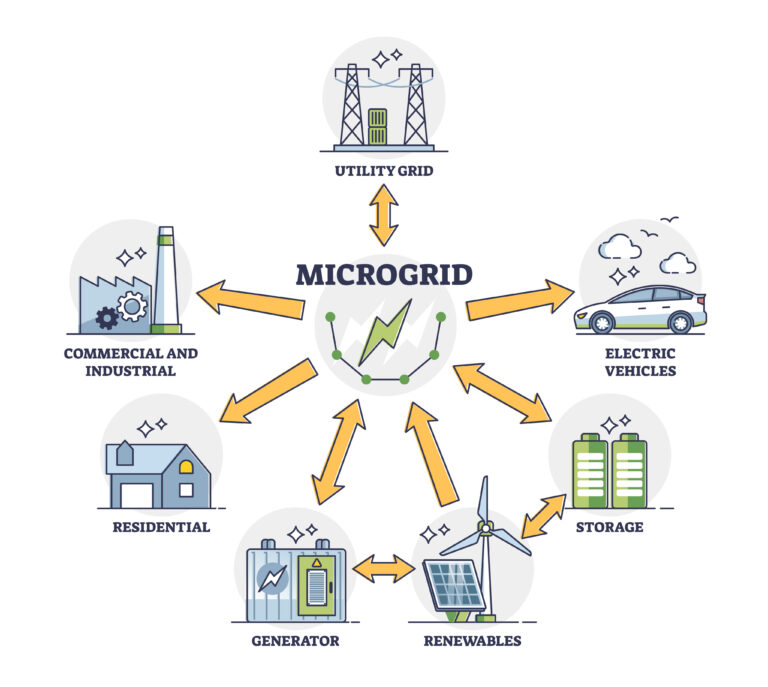By AJ Perkins, Director of Strategy and Development
In an age where sustainability is merging with defense strategy, collaborations between public entities and industry trailblazers like TechFlow have become paramount. Especially significant in this evolution is the military’s pivot to Electric Vehicles (EVs) and the strategic implementation of microgrids.

The Future of Energy: Exploring the Potential of Microgrids
Microgrids represent a revolutionary step in the realm of decentralized energy systems. Unlike traditional centralized electrical grids, microgrids have the ability to function independently, generating, distributing, and regulating electricity flow from various sources like solar panels and wind turbines. What makes them particularly intriguing is their equipped control systems, which offer the flexibility of autonomous operation or synchronization with the main power grid. This dual functionality ensures that energy usage is always at its most efficient and resilient.
Imagine a scenario where there’s a power outage. Instead of being left in the dark, microgrids ensure that essential or critical loads continue to receive power, enhancing energy resiliency. This capability is primarily due to their unique design, consolidating diverse energy sources and channeling them through a central control. Here, the energy is distributed optimally, considering various factors such as time, price, availability, and prevailing policy regulations.
At this juncture, it’s pertinent to highlight the role of TechFlow in this energy transformation. TechFlow, with its nearly 30-year track record of DoD partnership and team of world-class energy and mobility experts, plays a pivotal role in harnessing the capabilities of microgrids to drive value for its customers. Through smart integration, analytics, and innovative applications, TechFlow optimizes microgrid performance, ensuring that customers benefit from enhanced energy reliability, cost savings, and sustainable solutions.
Adding another layer of innovation, the rise in electric vehicles (EVs) has introduced a new dimension to microgrids. A fleet of EVs can act as a supplementary power source, allowing energy to be extracted from these vehicles and channeled to other parts of a facility. This dynamic interchange showcases the versatility and adaptability of microgrid systems.
And while the current image of a microgrid may be of a fixed stationary entity, technological advancements are rapidly changing this perception. The horizon holds promise for portable microgrids that can be moved and set up as needed, ensuring power distribution wherever required.
In essence, as the world becomes more energy-conscious and seeks out sustainable solutions, microgrids, with champions like TechFlow, stand out as a beacon of innovation, promising efficiency, resilience, and adaptability in the ever-evolving energy landscape.
Why the U.S. Military is Interested in Microgrids
- Strategic Agility & Autonomy: Microgrids offer a self-sustained energy model, reducing the military’s dependence on external fuel sources, which might be vulnerable in conflict zones.
- Operational Resilience: Especially in mission-critical operations where there’s zero tolerance for energy interruptions, microgrids provide consistent power, ensuring that military installations remain operational even if the main grid fails.
- Environmental Stewardship: Microgrids, especially when coupled with renewable energy sources like solar or wind, align with the military’s goals for sustainability and reduced carbon footprint.
- Cost Efficiency: Over time, using locally produced energy can prove to be cost-effective, reducing the financial burden of transporting and purchasing external energy.
How TechFlow is Helping the Military Move its Microgrid Ambitions Forward
TechFlow’s expertise lies at the intersection of military objectives and advanced technological solutions. With an established track record in harmonizing renewable energy solutions with EV charging, they’re strategically positioned to play an instrumental role in the military’s microgrid aspirations.
- Innovative Solutions: TechFlow brings state-of-the-art microgrid systems designed to ensure energy security, adaptability, and efficiency.
- Integration Expertise: The challenge isn’t just about setting up a microgrid but seamlessly integrating it with existing energy systems, renewables, and EV charging stations. TechFlow’s experience ensures smooth integration.
- Customized Strategies: Recognizing that each military base or operation might have unique requirements, TechFlow offers tailored solutions to cater to specific energy needs.
The synergy between TechFlow and the U.S. military exemplifies a new era where defense doesn’t just adapt but leads in the realm of sustainable practices. As the U.S. military continues its transformative journey towards a green and resilient future, with microgrids as a central piece of the puzzle, entities like TechFlow will remain invaluable allies in championing this cause.



